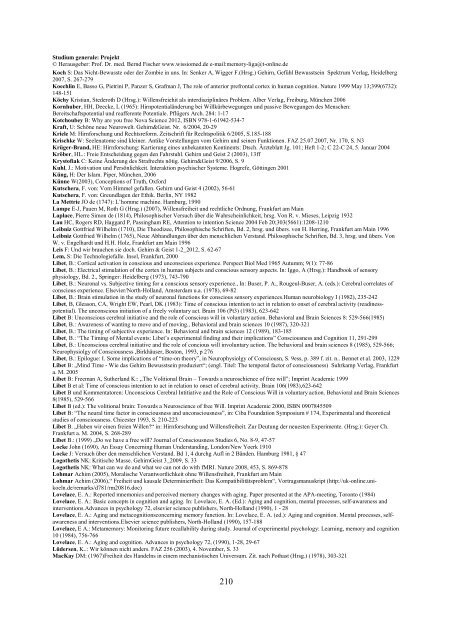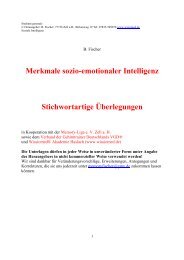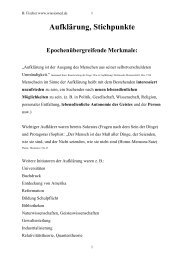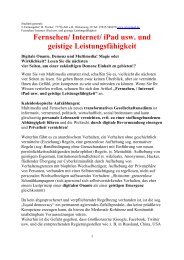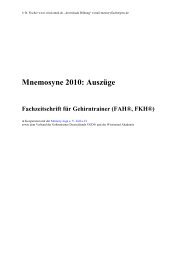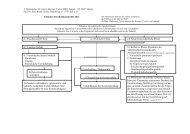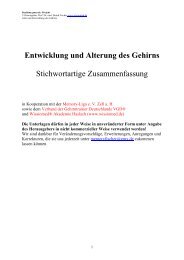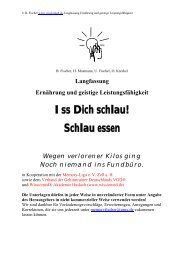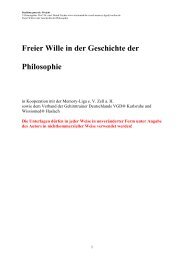Studium generale: Projekt© Herausgeber: Prof. Dr. med. Bernd Fischer www.wissiomed.de e-mail:memory-liga@t-online.deKoch S: Das Nicht-Bewusste oder der Zombie in uns. In: Senker A, Wigger F.(Hrsg.) Gehirn, Gefühl Bewusstsein Spektrum Verlag, Heidelberg2007, S. 267-279Koechlin E, Basso G, Pietrini P, Panzer S, Grafman J, The role of anterior prefrontal cortex in human cognition. Nature 1999 May 13;399(6732):148-151Köchy Kristian, Stederoth D (Hrsg.): <strong>Wille</strong>nsfreiehit als interdisziplinäres Problem. Alber Verlag, Freiburg, München 2006Kornhuber, HH, Deecke, L (1965): Hirnpotentialänderung bei Willkürbewegungen und passive Bewegungen des Menschen:Bereitschaftspotential und reafferente Potentiale. Pflügers Arch. 284: 1-17Kotchoubey B: Why are you free Nova Science 2012, ISBN 978-1-61942-534-7Kraft, U: Schöne neue Neurowelt. Gehirn&Geist. Nr. 6/2004, 20-29Kriele M: Hirnforschung und Rechtsreform. Zeitschrift für Rechtspolitik 6/2005, S.185-188Krischke W: Seelenatome sind kleiner. Antike Vorstellungen vom Gehirn und seinen Funktionen. FAZ 25.07.2007, Nr. 170, S. N3Krüger-Brand, HE: Hirnforschung: Kartierung eines unbekannten Kontinents: Dtsch. Ärzteblatt Jg. 101; Heft 1-2; C 22-C 24, 5. Januar 2004Kröber, HL.: Freie Entscheidung gegen den Fahrstuhl. Gehirn und Geist 2 (2003), 13ffKrystofiak C: Keine Änderung des Strafrechts nötig. Gehirn&Geist 9/2006, S. 9Kuhl, J.: Motivation und Persönlichkeit. Interaktion psychischer Systeme. Hogrefe, Göttingen 2001Küng, H: Der Islam. Piper, München, 2006Künne W(2003), Conceptions of Truth, OxfordKutschera, F. von: Vom Himmel gefallen. Gehirn und Geist 4 (2002), 56-61Kutschera, F. von: Greundlagen der Ethik. Berlin, NY 1982La Mettrie JO de (1747): L’homme machine. Hamburg, 1990Lampe E-J, Pauen M, Roth G (Hrsg.) (2007), <strong>Wille</strong>nsfreiheit und rechtliche Ordnung, Frankfurt am MainLaplace, Pierre Simon de (1814), Philosophischer Versuch über die Wahrscheinlichkeit, hrsg. Von R. v. Mieses, Leipzig 1932Lau HC, Rogers RD, Haggard P, Passingham RE, Attention to intention Science 2004 Feb 20;303(5661):1208-1210Leibniz Gottfried Wilhelm (1710), Die Theodizee, Philosophische Schriften, Bd. 2, hrsg. und übers. von H. Herring, Frankfurt am Main 1996Leibniz Gottfried Wilhelm (1765), Neue Abhandlungen über den menschlichen Verstand. Philosophische Schriften, Bd. 3, hrsg. und übers. VonW. v. Engelhardt und H.H. Holz, Frankfurt am Main 1996Leis F: Und wir brauchen sie doch. Gehirn & Geist 1-2_2012, S. 62-67Lem, S: Die Technologiefalle. Insel, Frankfurt, 2000Libet, B.: Cortical activation in conscious and unconscious experience. Perspect Biol Med 1965 Autumm; 9(1): 77-86Libet, B.: Electrical stimulation of the cortex in human subjects and conscious sensory aspects. In: Iggo, A (Hrsg.): Handbook of sensoryphysiology, Bd. 2., Springer: Heidelberg (1973), 743-790Libet, B.: Neuronal vs. Subjective timing for a conscious sensory experience., In: Buser, P. A., Rougeul-Buser, A. (eds.): Cerebral correlates ofconscious experience. Elsevier/North-Holland, Amsterdam u.a. (1978), 69-82Libet, B.: Brain stimulation in the study of neuronal functions for conscious sensory experiences.Human neurobiology I (1982), 235-242Libet, B, Gleason, CA, Wright EW, Pearl, DK (1983): Time of conscious intention to act in relation to onset of cerebral activity (readinesspotential).The unconscious initiation of a freely voluntary act. Brain 106 (Pt3) (1983), 623-642Libet B: Unconscious cerebral initiative and the role of conscious will in voluntary action. Behavioral and Brain Sciences 8: 529-566(1985)Libet, B.: Awareness of wanting to move and of moving., Behavioral and brain sciences 10 (1987), 320-321Libet, B.: The timing of subjective experience. In: Behavioral and brain sciences 12 (1989), 183-185Libet, B.: “The Timing of Mental events: Libet’s experimental finding and their implications” Consciousness and Cognition 11, 291-299Libet, B.: Unconscious cerebral initiative and the role of concious will involuntary action. The behavioral and brain sciences 8 (1985), 529-566;Neurophysiolgy of Consciousness ,Birkhäuser, Boston, 1993, p 276Libet, B.: Epilogue: I. Some implications of “time-on theory”, in Neurophysiolgy of Consciousn, S. 9ess, p. 389 f. zit. n.. Bennet et al. 2003, 1229Libet B: „Mind Time - Wie das Gehirn Bewusstsein produziert“; (engl. Titel: The temporal factor of consciousness) Suhrkamp Verlag, Frankfurta. M. 2005Libet B: Freeman A, Sutherland K:: „The Volitional Brain – Towards a neuroschience of free will”; Imprint Academic 1999Libet B et al: Time of conscious intention to act in relation to onset of cerebral activity. Brain 106(1983),623-642Libet B und Kommentatoren: Unconscious Cerebral Intitiative and the Role of Conscious Will in voluntary action. Behavioral and Brain Sciences8(1985), 529-566Libet B (ed.): The volitional brain: Towards a Neuroscience of free Will. Imprint Academic 2000, ISBN 0907845509Libet B: “The neural time factor in consciousness and unconsciousness”, in: Ciba Foundation Symposium # 174, Experimental and theoreticalstudies of consciousness. Chicester 1993, S. 210-223Libet B. „Haben wir einen freien <strong>Wille</strong>n?“ in: Hirnforschung und <strong>Wille</strong>nsfreiheit. Zur Deutung der neuesten Experimente. (Hrsg.): Geyer Ch.Frankfurt a. M. 2004, S. 268-289Libet B.: (1999) „Do we have a free will? Journal of Consciousness Studies 6, No. 8-9, 47-57Locke John (1690), An Essay Concerning Human Understanding, London/New Yoerk 1910Locke J: Versuch über den menschlichen Verstand. Bd 1, 4 durchg Aufl in 2 Bänden. Hamburg 1981, § 47Logothetis NK: Kritische Masse. GehirnGeist 3_2009, S. 33Logothetis NK: What can we do and what we can not do with fMRI. Nature 2008, 453, S. 869-878Lohmar Achim (2005), Moralische Verantwortlichkeit ohne <strong>Wille</strong>nsfreiheit, Frankfurt am MainLohmar Achim (2006),“ Freiheit und kausale Determiniertheit: Das Kompatibilitätsproblem“, Vortragsmanuskript (http://uk-online.unikoeln.de/remarks/d781/rm20816.doc)Lovelace, E. A.: Reported mnemonics and perceived memory changes with aging. Paper presented at the APA-meeting, Toronto (1984)Lovelace, E. A.: Basic concepts in cognition and aging. In: Lovelace, E. A. (Ed.): Aging and cognition, mental processes, self-awareness andinterventions.Advances in psychology 72, elsevier science publishers, North-Holland (1990), 1 - 28Lovelace, E. A.: Aging and metacognitionsconcerning memory function. In: Lovelace, E. A. (ed.): Aging and cognition. Mental processes, selfawarenessand interventions.Elsevier science publishers, North-Holland (1990), 157-188Lovelace, E A.: Metamemory: Monitoring future recallability during study. Journal of experimental psychology: Learning, memory and cognition10 (1984), 756-766Lovelace, E. A.: Aging and cognition. Advances in psychology 72, (1990), 1-28, 29-67Lüdersen, K..: Wir können nicht anders. FAZ 256 (2003), 4. November, S. 33MacKay DM: (1967)Freiheit des Handelns in einem mechanistischen Universum. Zit. nach Pothast (Hrsg.) (1978), 303-321210
Studium generale: Projekt© Herausgeber: Prof. Dr. med. Bernd Fischer www.wissiomed.de e-mail:memory-liga@t-online.deMacki JL (1977), Ethik.Auf der Suche nach dem Richtigen und Falschen, Stuttgart 1983Madeia M: Neuromdestia Gehirn&Geist 7-8/2006, S. 50Mannewitz C: Begriffe besser trennen. Gehirn und Geist 9/2006Markl, H.: Wer Erkenntnis sucht, sollte erst einmal Erkennen lernen. FAZ, 24.04.2004, Nr.96, S. 39Markl H: Das Menschenbild als Palimpset Gehirn & Geist 7/2004 40-41Markl H: Gehirn und Geist: Biologie und Psychologie auf der Suche nach dem ganzen Menschen. Psychologische Rundschau 2005, 56, 20-35Markowitsch HJ: Hirnforschung im 21. Jahrhundert. Gehirn und Geist. 4/2005, 6Markowitsch HJ, Siefer W: Tatort Gehirn. Auf der Suche nach dem Ursprung des Verbrechens. Campus, Frankfurt a. M. 2007Mausfeld R: Kann der Mensch sich selbst erkennen? Contra: Wir haben nicht den Schimmer einer Idee, wie Bewusstsein entsteht. GejoWissen .2006, Nr. 38, S. 29-31Maye A, Hsieh Chi-hao, Sugihara G, Brembs B: Order in spontaneous behavior. PLoS ONE 2(5):e443 doi:10.1371/journal.pone0000443s. a. http://brembs.net/spontaneousMayer H (2004): Ach, das Gehirn. Über einige neurowissenschaftliche Publikationen. In: Christian G (Hrsg.): Hirnforschung und <strong>Wille</strong>nsfreiheit.Zur Deutung der neuesten Experimente. Frankfurt a. M.Mayer H: Am Gehirn sollt ihr sie erkennen. FAZ 17.09.2007, Nr. 216, S. 37Mayer H: Labor und Lehstuhl DenkorteMax-Plank-Gesellschaft; Pressinformation, B/2008(77McCabe DP, Castel AD: Seeing is Beelieving: The effect of Brain Images on Judgements of Scientific Reasoning. In: Cognition 2008, 107(1):343-352McGinn, C: Wie kommt der Geist in die Materie? Piper, München 2004Meier-Koll A: Wie groß ist Platons Höhle.ISBN:3 499 60823 5Mele AR (2006), Free Will and Luck, OxfordMerkel R: <strong>Wille</strong>nsfreiheit und rechtliche Schuld. Eine strafrechtspolitische Untersuchung, Nomos Baden-Baden, 2008Merkel R: <strong>Wille</strong>nsfreiheit und rechtliche Schuld, in: Liesmann (Hrsg.) (2007), 68-110Merton R: Wissenschaft und demokratische Sozialstruktur., in Weingart P (Hrsg.): Wissenschaftssoziologie: Wissenschaftlicher Entwicklung alssozialer Prozesss Frankfurt a. M, Athenäum, 1972, S. 45-59Metzinger Th: The problem of consciousness, Paderborn 1995Metzinger T: „Beeing no ones“-Eine sehr kurze Zusammenfassung. In: Grundkurs Philosophie des Geistes. Band 1: Phänomenales Bewusstsein.Paderborn: mentis 2006, S. 421-476Metzinger Th: The problem of consciousness. In: Metzinger Th (ed.): Conscious experience. Paderborn 1995, 3-40Metzinger T: Der Preis der Selbsterkenntnis Gehirn&Geist 7-8/2006, S. 42- 49Metzinger T (Hrsg.). (1996): Bewusstsein. Beiträge aus der Gegenwartsphilosophie (3. Aufl.) Schöningh., PaderbornMetzinger T: Subjekt und Subjektmodell. Die Perspektivität phänomenalen Bewusstseins vor dem Hintergrund einer naturalistischen Theoriementaler Repräsentationen Mentis, Paderborn, 1999Metzinger T: Der Ego-Tunnel, Berlin Verlag 2009Michael W: Wir sind so frei. Müssen wir unser Menschenbild korrigieren? http://www.Sprache-werner.Info/gehirn/gehirn-geow-wir-sind-sofrei.htmlMill John Stuart (1836), “On the Definition of Political Economy; and on the Method of ‘Investigation Proper to IT’”, in: Mill JS: CollectedWorks, Vol IV, ed. By J.M. Robson, Toronto 1967, 309-339Mill John Stuart (1843), A System of Logic, Ratiocinative and Inductive, (= Collected Works, Vol. VII/VIII), ed by J:M: Robson, Toronto1973/1974Mill John Stuart (1859), On Liberty, Oxford 1947Mill John Stuart (1859), Utilraianism (= Collected Works, Vol X, ed. By J.M. Robson), Toronto 1969Milner B, Squire LL, Kandel ER: Cognitive neuroscience and the study of memory. Neuron 20 (1998), p.446Monroe RA: Der Mann mit den zwei Leben. Reisen außerhalb des Körpers. Knaur, München 1986Moore George Edward (1912), Ethics, London, dt. Auszüge zit. Nach: Pothast (Hrsg..) (1978), 142-156Müller KE: der sechste Sinn. Ethnologische Studien zu Phänomen der außersinnlichen Wahrnehmung. Transcript, Bielefeld 2004Müller-JungJ: Die Grenzen der Deutungsmacht. Die Hirnforschung platzt aus allen Nähten. Seit die funktionelle Kernspintomographie massivexpandiert, schießen viele mit ihren Interpretationen zur Funktion des Gehirns über das Ziel hinaus. FAZ. 25.06.2008. Nr. 1456. S. N1Murken S, Müller C (2007): Gott hat mich so ausgestattet, dass ich den Weg gehen kann. Religiöse Verarbeitungsstile nach der DiagnoseBrustkrebs. Lebendiges Zeugnis, 62,115-128Murken S (1998). Hilft die Gottesbeziehung Eine beziehungstheoretische Analyse. In Nestler E, Henning C (Hrsg.), Religion und Religiositätzwischen theologie und Psychologie. Bad Boller Beiträge zur Religionspsychologie, S. 205-236. Frankfurt a. M., LangMurken S (1998): Gottesbeziehunbg und psychische Gesundheit. Die entwicklung eines Modells und seine empirische Überprüfung, MünsterWaxmannMurrag, E. J.: Motivation and emotion.Englewood cliffs, N. Y.: Prentice Hall (1984)Mutschler, H-D: „Ist der Geist erklärbar?“ Katholische Akademie in Bayern, München, Kardinal Wendel Haus, Mandlstraße 23 20.04.2004)ExzerptMutschler, H-D: Naturphilosophie, Kohlhammer Urban, Stuttgart 2002Neumann O, Prinz W (1987), Kognitive Antezidenzien von Willkürhandlungen, in: Heckhausen H, Gollwitzer PM, Weinert FE (Hrsg.): Jenseitsdes Rubikon: Der <strong>Wille</strong> in den Humanwissenschaften, Berlin, 195-215Newberg A, D’Aquili E, Rause V: Der gedachte Gott. Wie Glaube im Gehirn entsteht. Piper, München 2003Nida-Rümelin J: Über die menschliche Freiheit, Stuttgart, 2005Nida-Rümelin J: Strukturelle Nationalität. Ein philosophischer Essay über praktische Vernunft, Stuttgart 2001Noe A: Du bist nicht dein Gehirn. Piper 2010Nordhoff G: Neurophilosophie – ein neuer Ansatz in der Philosophie www-sprache-werner.infoNordhoff G: Neuropsychiatrie und Neurophilosophie Mentis, Paderborn, 1997Nordhoff G:Das Gehirn. Eine neurophilosophische Bestandsaufnahme Meentis, Paderborn, 2000Nordhoff G: Personale Identität und operative Eingriffe in das Gehirn Mentis, Paderborn 1999Obhi S, Haggard, P.: Der freie <strong>Wille</strong> auf dem Prüfstand: Spektrum der Wissenschaft April. 2005, 90-97Obhi S, Haggard, P.: The relative effects of external spatial and motoric factors on the bimanual coordination of discrete movements.Experimental Brain Research, Bd. 154, 2003, S. 399211
- Seite 1 und 2:
Studium generale: Projekt© Herausg
- Seite 3 und 4:
Studium generale: Projekt© Herausg
- Seite 5 und 6:
Studium generale: Projekt© Herausg
- Seite 7 und 8:
Studium generale: Projekt© Herausg
- Seite 9 und 10:
Studium generale: Projekt© Herausg
- Seite 11 und 12:
Studium generale: Projekt© Herausg
- Seite 13 und 14:
Studium generale: Projekt© Herausg
- Seite 15 und 16:
Studium generale: Projekt© Herausg
- Seite 17 und 18:
Studium generale: Projekt© Herausg
- Seite 19 und 20:
Studium generale: Projekt© Herausg
- Seite 21 und 22:
Studium generale: Projekt© Herausg
- Seite 23 und 24:
Studium generale: Projekt© Herausg
- Seite 25 und 26:
Studium generale: Projekt© Herausg
- Seite 27 und 28:
Studium generale: Projekt© Herausg
- Seite 29 und 30:
Studium generale: Projekt© Herausg
- Seite 31 und 32:
Studium generale: Projekt© Herausg
- Seite 33 und 34:
Studium generale: Projekt© Herausg
- Seite 35 und 36:
Studium generale: Projekt© Herausg
- Seite 37 und 38:
Studium generale: Projekt© Herausg
- Seite 39 und 40:
Studium generale: Projekt© Herausg
- Seite 41 und 42:
Studium generale: Projekt© Herausg
- Seite 43 und 44:
Studium generale: Projekt© Herausg
- Seite 45 und 46:
Studium generale: Projekt© Herausg
- Seite 47 und 48:
Studium generale: Projekt© Herausg
- Seite 49 und 50:
Studium generale: Projekt© Herausg
- Seite 51 und 52:
Studium generale: Projekt© Herausg
- Seite 53 und 54:
Studium generale: Projekt© Herausg
- Seite 55 und 56:
Studium generale: Projekt© Herausg
- Seite 57 und 58:
Studium generale: Projekt© Herausg
- Seite 59 und 60:
Studium generale: Projekt© Herausg
- Seite 61 und 62:
Studium generale: Projekt© Herausg
- Seite 63 und 64:
Studium generale: Projekt© Herausg
- Seite 65 und 66:
Studium generale: Projekt© Herausg
- Seite 67 und 68:
Studium generale: Projekt© Herausg
- Seite 69 und 70:
Studium generale: Projekt© Herausg
- Seite 71 und 72:
Studium generale: Projekt© Herausg
- Seite 73 und 74:
Studium generale: Projekt© Herausg
- Seite 75 und 76:
Studium generale: Projekt© Herausg
- Seite 77 und 78:
Studium generale: Projekt© Herausg
- Seite 79 und 80:
Studium generale: Projekt© Herausg
- Seite 81 und 82:
Studium generale: Projekt© Herausg
- Seite 83 und 84:
Studium generale: Projekt© Herausg
- Seite 85 und 86:
Studium generale: Projekt© Herausg
- Seite 87 und 88:
Studium generale: Projekt© Herausg
- Seite 89 und 90:
Studium generale: Projekt© Herausg
- Seite 91 und 92:
Studium generale: Projekt© Herausg
- Seite 93 und 94:
Studium generale: Projekt© Herausg
- Seite 95 und 96:
Studium generale: Projekt© Herausg
- Seite 97 und 98:
Studium generale: Projekt© Herausg
- Seite 99 und 100:
Studium generale: Projekt© Herausg
- Seite 101 und 102:
Studium generale: Projekt© Herausg
- Seite 103 und 104:
Studium generale: Projekt© Herausg
- Seite 105 und 106:
Studium generale: Projekt© Herausg
- Seite 107 und 108:
Studium generale: Projekt© Herausg
- Seite 109 und 110:
Studium generale: Projekt© Herausg
- Seite 111 und 112:
Studium generale: Projekt© Herausg
- Seite 113 und 114:
Studium generale: Projekt© Herausg
- Seite 115 und 116:
Studium generale: Projekt© Herausg
- Seite 117 und 118:
Studium generale: Projekt© Herausg
- Seite 119 und 120:
Studium generale: Projekt© Herausg
- Seite 121 und 122:
Studium generale: Projekt© Herausg
- Seite 123 und 124:
Studium generale: Projekt© Herausg
- Seite 125 und 126:
Studium generale: Projekt© Herausg
- Seite 127 und 128:
Studium generale: Projekt© Herausg
- Seite 129 und 130:
Studium generale: Projekt© Herausg
- Seite 131 und 132:
Studium generale: Projekt© Herausg
- Seite 133 und 134:
Studium generale: Projekt© Herausg
- Seite 135 und 136:
Studium generale: Projekt© Herausg
- Seite 137 und 138:
Studium generale: Projekt© Herausg
- Seite 139 und 140:
Studium generale: Projekt© Herausg
- Seite 141 und 142:
Studium generale: Projekt© Herausg
- Seite 143 und 144:
Studium generale: Projekt© Herausg
- Seite 145 und 146:
Studium generale: Projekt© Herausg
- Seite 147 und 148:
Studium generale: Projekt© Herausg
- Seite 149 und 150:
Studium generale: Projekt© Herausg
- Seite 151 und 152:
Studium generale: Projekt© Herausg
- Seite 153 und 154:
Studium generale: Projekt© Herausg
- Seite 155 und 156:
Studium generale: Projekt© Herausg
- Seite 157 und 158:
Studium generale: Projekt© Herausg
- Seite 159 und 160: Studium generale: Projekt© Herausg
- Seite 161 und 162: Studium generale: Projekt© Herausg
- Seite 163 und 164: Studium generale: Projekt© Herausg
- Seite 165 und 166: Studium generale: Projekt© Herausg
- Seite 167 und 168: Studium generale: Projekt© Herausg
- Seite 169 und 170: Studium generale: Projekt© Herausg
- Seite 171 und 172: Studium generale: Projekt© Herausg
- Seite 173 und 174: Studium generale: Projekt© Herausg
- Seite 175 und 176: Studium generale: Projekt© Herausg
- Seite 177 und 178: Studium generale: Projekt© Herausg
- Seite 179 und 180: Studium generale: Projekt© Herausg
- Seite 181 und 182: Studium generale: Projekt© Herausg
- Seite 183 und 184: Studium generale: Projekt© Herausg
- Seite 185 und 186: Studium generale: Projekt© Herausg
- Seite 187 und 188: Studium generale: Projekt© Herausg
- Seite 189 und 190: Studium generale: Projekt© Herausg
- Seite 191 und 192: Studium generale: Projekt© Herausg
- Seite 193 und 194: Studium generale: Projekt© Herausg
- Seite 195 und 196: Studium generale: Projekt© Herausg
- Seite 197 und 198: Studium generale: Projekt© Herausg
- Seite 199 und 200: Studium generale: Projekt© Herausg
- Seite 201 und 202: Studium generale: Projekt© Herausg
- Seite 203 und 204: Studium generale: Projekt© Herausg
- Seite 205 und 206: Studium generale: Projekt© Herausg
- Seite 207 und 208: Studium generale: Projekt© Herausg
- Seite 209: Studium generale: Projekt© Herausg
- Seite 213 und 214: Studium generale: Projekt© Herausg
- Seite 215 und 216: Studium generale: Projekt© Herausg
- Seite 217: Studium generale: Projekt© Herausg


